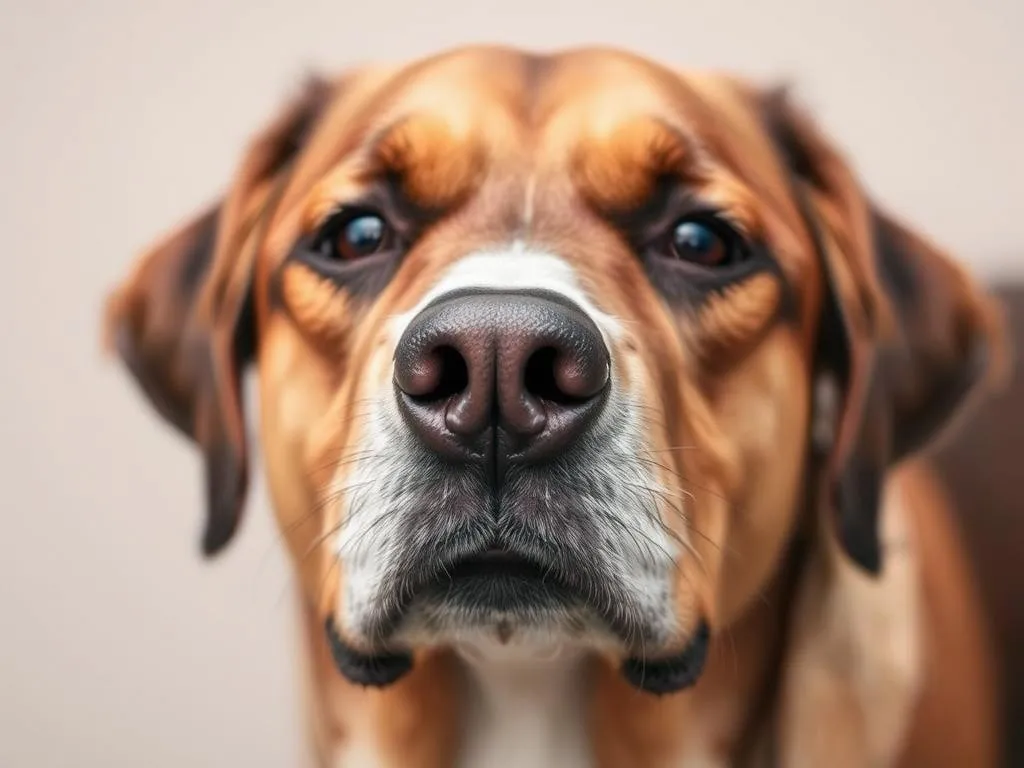
Understanding your dog’s health is a vital aspect of responsible pet ownership. One of the common areas of concern is a dog’s nose, which can serve as an indicator of overall well-being. A dog’s nose is not just a cute feature; it plays a crucial role in their sensory perception and helps owners gauge their pet’s health. This leads us to the question: what does it mean if a dog’s nose is dry? This article aims to shed light on this topic, helping you understand the implications of a dry nose in dogs.
Understanding a Dog’s Nose
Anatomy of a Dog’s Nose
A dog’s nose is a complex organ designed primarily for smelling. It consists of moist tissue known as the nasal epithelium, which helps trap scent particles. The moisture on a dog’s nose is essential for enhancing their sense of smell, which is estimated to be 10,000 to 100,000 times more sensitive than that of humans. The unique structure of a dog’s nose, including its folds and ridges, aids in detecting different scents in the environment.
Normal Nose Conditions
A healthy dog’s nose is typically cool and moist. However, the level of moisture can vary significantly throughout the day and can be influenced by several factors, such as:
- Environmental Conditions: Weather changes, humidity levels, and temperature can all affect nose moisture.
- Activity Level: After exercise, a dog’s nose may feel drier.
- Breed Variations: Some breeds naturally have drier noses than others.
Understanding these nuances is essential for determining what might be normal for your dog.
What Does It Mean If a Dog’s Nose Is Dry?
Common Causes of a Dry Nose
A dry nose can be alarming for dog owners, but it’s important to know that it can result from several benign causes, including:
- Dehydration: If your dog isn’t drinking enough water, it can lead to a dry nose. Always ensure your pet has access to fresh water.
- Environmental Factors: Heat and low humidity can dry out a dog’s nose, especially during summer months or in arid climates.
- Allergies: Allergic reactions to food, pollen, or chemicals can cause dryness and irritation.
- Illness: Certain medical conditions, such as infections or autoimmune diseases, can manifest as a dry nose.
When to Be Concerned
While a dry nose can be normal, there are situations where it may signal a health issue. Consider seeking veterinary advice if you notice:
- Persistent Dryness: A nose that remains dry for an extended period without improvement.
- Other Symptoms: Accompanying signs like lethargy, loss of appetite, vomiting, or changes in behavior might indicate a more serious problem.
- Cracking or Bleeding: Any visible damage to the nose should prompt a visit to the vet.
Diagnosing the Cause of Dry Nose
Observational Methods
When assessing your dog’s health, start by observing for any additional symptoms. Look for:
- Behavioral Changes: Is your dog less active or more irritable than usual?
- Physical Signs: Are there any changes in appetite, drinking habits, or bathroom behavior?
These observations can provide your veterinarian with valuable information when diagnosing the cause of the dry nose.
Veterinary Consultation
If the dry nose persists or is accompanied by other concerning symptoms, consult your veterinarian. They will likely perform several assessments, including:
- Physical Examination: Checking for skin conditions, infections, or other abnormalities.
- Blood Tests: To rule out underlying health issues such as dehydration or autoimmune disorders.
- Skin Scraping or Biopsy: If skin conditions are suspected, these tests can provide more insights.
Remedies and Treatment Options
Home Remedies
For mild cases of dry noses, there are several home remedies that can help:
- Hydration: Ensure your dog has access to fresh, clean water at all times. Adding moisture-rich foods can also help.
- Environmental Adjustments: Maintain a comfortable humidity level in your home, especially in winter when heating can dry out the air.
- Natural Moisturizers: Coconut oil or specialized dog nose balms can be applied sparingly to soothe dryness.
Veterinary Treatments
If the dry nose is due to an underlying health issue, your veterinarian may recommend specific treatments, such as:
- Medications: For allergies or infections, antihistamines or antibiotics might be prescribed.
- Topical Treatments: Creams or ointments may be used to address dry or cracked skin.
Following your vet’s recommendations is crucial for your dog’s recovery.
Prevention Strategies
Maintaining Hydration
One of the simplest ways to prevent a dry nose is to ensure your dog stays hydrated. Here are some tips:
- Fresh Water: Always provide fresh water, and consider using a pet water fountain to encourage drinking.
- Diet: Incorporate high-quality, moisture-rich dog food to help maintain hydration.
Regular Health Check-ups
Routine veterinary visits are essential for catching potential health issues early. Regular check-ups can lead to:
- Preventative Care: Keeping vaccinations up to date and addressing any health concerns before they escalate.
- Monitoring Changes: Your vet can help monitor your dog’s health and provide advice tailored to their specific needs.
Conclusion
The health of a dog’s nose can provide valuable insights into their overall well-being. Understanding the implications of a dry nose is important for every dog owner. By being observant and proactive about your dog’s health, you can ensure they lead a happy, healthy life. If you have concerns about your dog’s nose or any other health issues, do not hesitate to consult with your veterinarian.
FAQs
Can a dog’s nose be dry at night?
Yes, it’s common for a dog’s nose to be drier at night due to less activity and changes in the environment. However, if the dryness persists or is accompanied by other symptoms, consult your veterinarian.
Are certain breeds more prone to dry noses?
Some breeds are indeed more prone to dry noses due to their unique anatomical features. Breeds like Bulldogs and Pugs may have more noticeable dryness due to their facial structure.
What other symptoms might accompany a dry nose?
Additional symptoms to watch for include coughing, sneezing, lethargy, vomiting, or diarrhea. If these symptoms occur alongside a dry nose, seek veterinary advice.
How can I tell if my dog is dehydrated?
Signs of dehydration in dogs include dry gums, lethargy, loss of appetite, and decreased skin elasticity. If you suspect your dog is dehydrated, contact your vet immediately.
What should I do if my dog’s nose is dry and cracked?
If your dog’s nose is dry and cracked, apply a natural moisturizer like coconut oil and monitor for other symptoms. If the condition persists, consult your veterinarian for further evaluation.
By understanding your dog’s health and recognizing the significance of a dry nose, you can help ensure they receive the care they need for a long, happy life.









